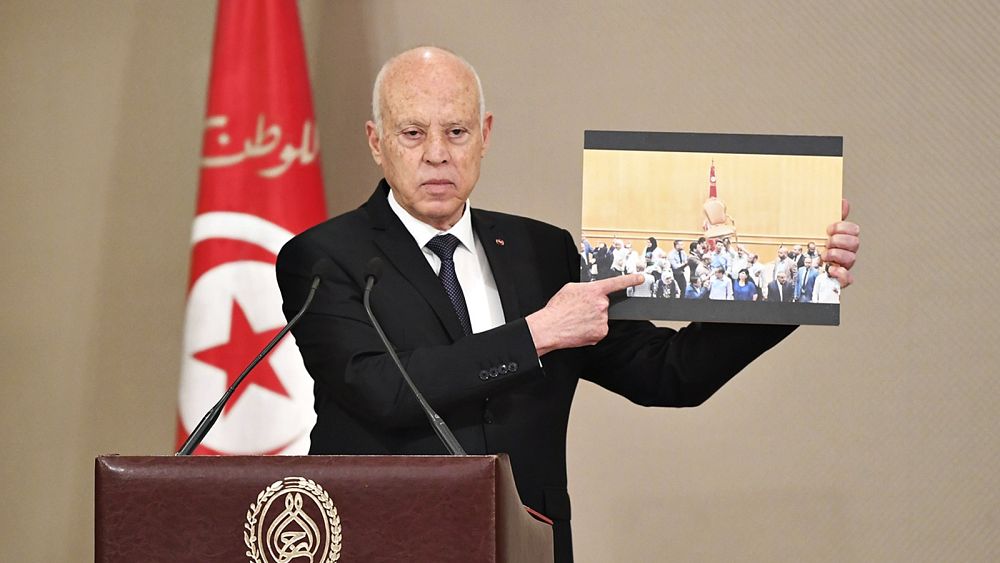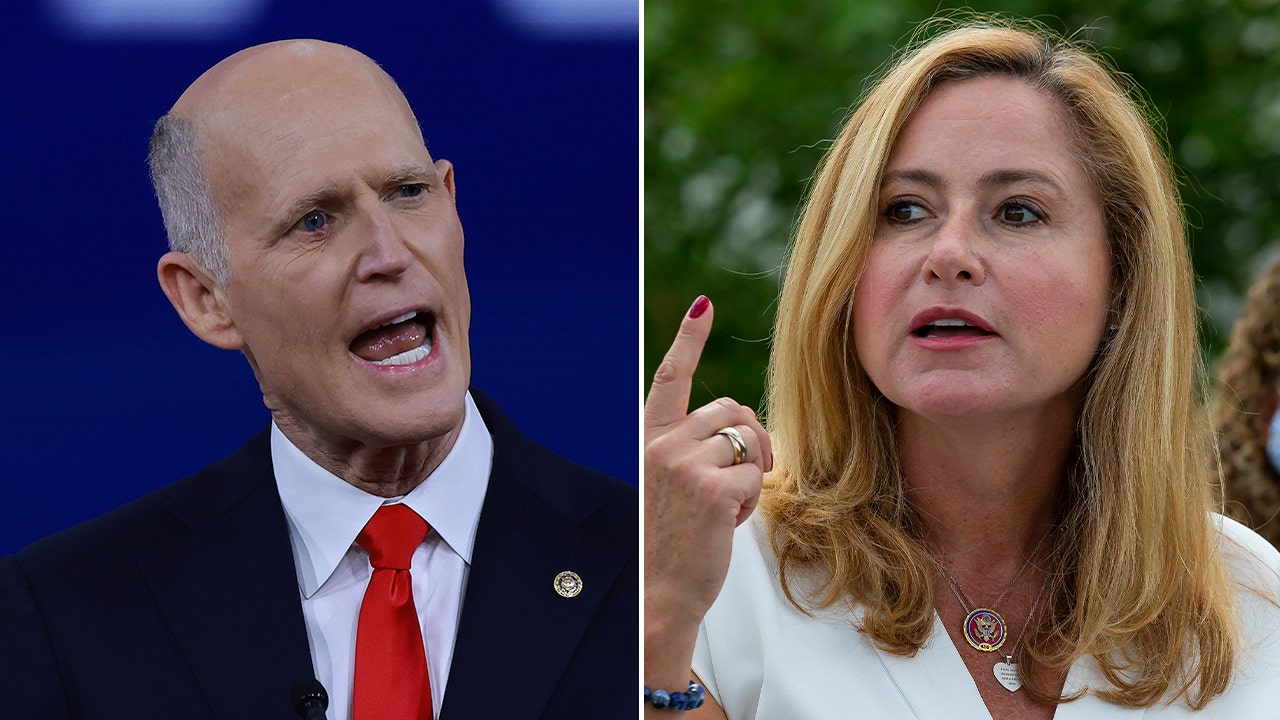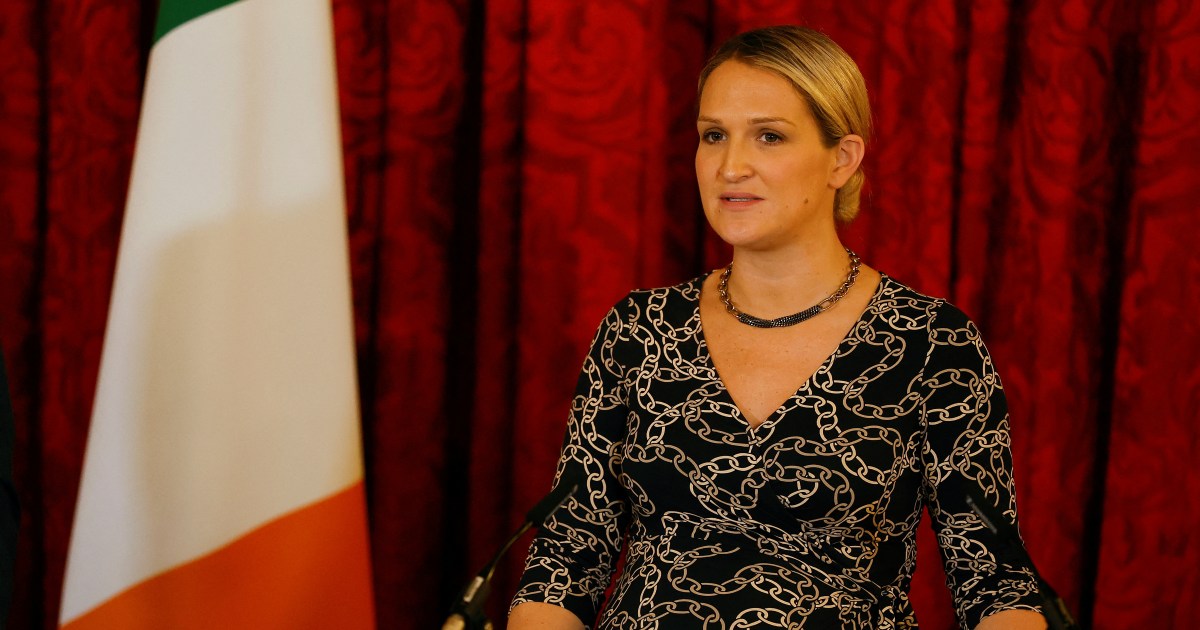World
MEPs blast Commission for signing deal with Tunisia’s ‘cruel dictator’

Members of the European Parliament denounced on Tuesday a new memorandum of understanding signed with Tunisia.
The deal was concluded on Sunday after a meeting in Tunis between Tunisian President Kais Saied and European Commission President Ursula von der Leyen, who was joined by Italian Prime Minister Giorgia Meloni and Dutch Prime Minister Mark Rutte.
The text, which still needs to be fleshed out, earmarks at least €700 million in EU funds, some as loans, across five thematic pillars: macro-economic stability, economy and trade, the green transition, people-to-people contacts and migration.
While von der Leyen hailed the memorandum as a “strategic and comprehensive partnership,” MEPs took a highly critical view on the matter, branding it as a contradiction between the European Union’s core values and Tunisia’s continued democratic backsliding. They also lamented an absence of democratic transparency and financial accountability.
The figure of Kais Saied, a man who has openly spread racist narratives against black African migrants in a manner that echoes the far-right conspiracy theory known as the “great replacement,” was subject to furious censure from lawmakers.
“It’s very clear: a deal has been made with a dictator who’s cruel, who’s unreliable,” said Sophie in ‘t Veld, a Dutch MEP who sits with the liberal Renew Europe group. “President Saied is an authoritarian ruler, he’s not a good partner, (he’s) a dictator who’s actually boosted the number of departures.”
Speaking on behalf of the Socialists & Democrats (S&D), Birgit Sippel accused the Tunisian authorities of abandoning Sub-Saharan migrants in the desert “without food, water or anything else,” a pattern of behaviour that has been previously reported by media and humanitarian organisations.
“Why should Tunisia suddenly change its behaviour? And who is controlling for what purpose the money will be spent?” Sippel said, looking visibly angry.
“We are now again financing an autocrat without political, democratic scrutiny here in the house. This will not be a solution. It will strengthen an autocrat in Tunisia,” she added.
Facing the grilling was Ylva Johansson, the European Commissioner for home affairs, who steered away from any controversies and calmly defended the EU-Tunisia memorandum, which, she underlined, introduces obligations on both sides.
“It’s clear that Tunisia is under pressure. In my view, this is a reason to strengthen and deepen the cooperation and step up the support to Tunisia,” Johansson told MEPs.
According to Johansson, this year has so far seen 45,000 asylum seekers leaving Tunisia to attempt to cross the “very deadly route” of the Central Mediterranean. This “huge increase,” she said, suggests a shift in Tunisia’s role, from country of origin to country of transit, given that “out of these 45,000, only 5,000 were Tunisian citizens.”
“It’s very important that our main objective always must be to save lives, to prevent people from going on these journeys that too often end by ending their lives, this is a priority,” the Commissioner added.
Money was another source of friction during Tuesday’s hearing.
Lawmakers honed in on the two financial envelopes that are most central to the deal: €150 million for budget support and €105 million for migration management, both of which will be disbursed gradually. Some MEPs portrayed the budget support, which is supposed to sustain the country’s precarious economy, as a cash injection to Saied’s private coffers that would be impossible to track down.
“You have financed a dictator who flouts human rights, who tramples on the Tunisian democracy that we have supported so much. Don’t lie to us!” Mounir Satouri, from the Greens, told Johansson. “According to our analyses, the €150 and €105 million are an aid to the (Tunisian) Treasury, a direct payment into the bank account of Mr Kais Saied.”
Maria Arena, from the socialists, excoriated the European Commission for failing to add additional provisions that would make payments conditional on the respect for human rights. (Senior EU officials have said the memorandum does not contain extra guarantees besides the traditional clauses of other foreign aid programmes.)
“We are giving a blank cheque to Mr Saied, who is currently running racist, xenophobic campaigns, supported by his police and military,” Arena said, in a blistering attack.
“Do you really believe that Mr Saied, who has dismissed his parliament, who has thrown judges in jail, who has resigned half his jurisdiction, who is now banning bloggers from talking about the migration issue and who is now using his police and military to send people back to the (Libyan) border, do you really believe that Mr Saied is going to respect human rights? Ms Johansson, either you’re naïve or you’re just telling us stories.”
In her replies, Johansson insisted the €105 million earmarked for migration would be “mainly” channelled through international organisations that work on the ground and provide relief to asylum seekers, like the International Organization for Migration (IOM), although she conceded some funds would be, in fact, provided to the Tunisian guards in the form of search-and-rescue vessels and radars.
“Let me stress: the European Commission, the EU, we are not involved in any pushbacks of any third-country nationals to their country of origin. What we’re doing is financing via IOM the voluntary returns and reintegration of third-country nationals,” Johansson said.
“I do not agree with the description that Tunisia is blackmailing. I think we have good cooperation with Tunisia but it’s also important to strengthen this cooperation and to step up the support for Tunisia. And this is the aim of this memorandum of understanding.”

World
With help from AI, Randy Travis got his voice back. Here's how his first song post-stroke came to be
With some help from artificial intelligence, country music star Randy Travis, celebrated for his timeless hits like “Forever and Ever, Amen” and “I Told You So,” has his voice back.
In July 2013, Travis was hospitalized with viral cardiomyopathy, a virus that attacks the heart, and later suffered a stroke. The Country Music Hall of Famer had to relearn how to walk, spell and read in the years that followed. A condition called aphasia limits his ability to speak — it’s why his wife Mary Travis assists him in interviews. It’s also why he hasn’t released new music in over a decade, until now.
“What That Came From,” which released Friday, is a rich acoustic ballad amplified by Travis’ immediately recognizable, soulful vocal tone.
Cris Lacy, Warner Music Nashville co-president, approached Randy and Mary Travis and asked: “‘What if we could take Randy’s voice and recreate it using AI?,’” Mary Travis told The Associated Press over Zoom last week, Randy smiling in agreement right next to her. “Well, we were all over that, so we were so excited.”
“All I ever wanted since the day of a stroke was to hear that voice again.”
Lacy tapped developers in London to create a proprietary AI model to begin the process. The result was two models: One with 12 vocal stems (or song samples), and another with 42 stems collected across Travis’ career — from 1985 to 2013, says Kyle Lehning, Travis’ longtime producer. Lacy and Lehning chose to use “Where That Came From,” a song written by Scotty Emerick and John Scott Sherrill that Lehning co-produced and held on to for years. He believed it could best articulate the humanity of Travis’ idiosyncratic vocal style.
“I never even thought about another song,” Lehning said.
Once he input the demo vocal (sung by James Dupree) into the AI models, “it took about five minutes to analyze,” says Lehning. “I really wish somebody had been here with a camera because I was the first person to hear it. And it was stunning, to me, how good it was sort of right off the bat. It’s hard to put an equation around it, but it was probably 70, 75% what you hear now.”
“There were certain aspects of it that were not authentic to Randy’s performance,” he said, so he began to edit and build on the recording with engineer Casey Wood, who also worked closely with Travis over a few decades.
The pair cherrypicked from the two models, and made alterations to things like vibrato speed, or slowing and relaxing phrases. “Randy is a laid-back singer,” Lehning says. “Randy, in my opinion, had an old soul quality to his voice. That’s one of the things that made him unique, but also, somehow familiar.”
His vocal performance on “What That Came From” had to reflect that fact.
“We were able to just improve on it,” Lehning says of the AI recording. “It was emotional, and it’s still emotional.”
Mary Travis says the “human element,” and “the people that are involved” in this project, separate it from more nefarious uses of AI in music.
“Randy, I remember watching him when he first heard the song after it was completed. It was beautiful because at first, he was surprised, and then he was very pensive, and he was listening and studying,” she said. “And then he put his head down and his eyes were a little watery. I think he went through every emotion there was, in those three minutes of just hearing his voice again.”
Lacy agrees. “The beauty of this is, you know, we’re doing it with a voice that the world knows and has heard and has been comforted by,” she says.
“But I think, just on human terms, it’s a very real need. And it’s a big loss when you lose the voice of someone that you were connected to, and the ability to have it back is a beautiful gift.”
They also hope that this song will work to educate people on the good that AI can do — not the fraudulent activities that so frequently make headlines. “We’re hoping that maybe we can set a standard,” Mary Travis says, where credit is given where credit is due — and artists have control over their voice and work.
Last month, over 200 artists signed an open letter submitted by the Artist Rights Alliance non-profit, calling on artificial intelligence tech companies, developers, platforms, digital music services and platforms to stop using AI “to infringe upon and devalue the rights of human artists.” Artists who co-signed included Stevie Wonder, Miranda Lambert, Billie Eilish, Nicki Minaj, Peter Frampton, Katy Perry, Smokey Robinson and J Balvin.
So, now that “Where That Came From” is here, will there be more original Randy Travis songs in the future?
“There may be others,” says Mary Travis. “We’ll see where this goes. This is such a foreign territory. There’s likely more on the horizon.”
“We do have other tracks,” says Lacy, but Warner Music is being as selective. “This isn’t a stunt, and it’s not a parlor trick,” she added. “It was important to have a song worthy of him.”
World
A military court sentences 8 Congolese army soldiers to death for cowardice, other crimes

A military court in eastern Congo on Friday sentenced eight soldiers to death for cowardice and other crimes linked to fleeing the battlefield, as the government struggles to contain violence and attacks in the mineral-rich area where many armed groups operate.
In March, Congo lifted a more than 20-year moratorium on the death penalty, stating that those guilty of treason and espionage were able to get away without proper punishment. Human rights organizations criticized the decision.
BOMBING AT REFUGEE CAMP KILLS 5 PEOPLE, INCLUDING CHILDREN, IN EASTERN CONGO
Alexis Olenga, a lawyer for Paluku Olenga, one of the soldiers sentenced to death, said his client had not fled the battlefield because he was arrested in the area of his assignment.
A military court in eastern Congo has sentenced eight soldiers to death for cowardice and other crimes linked to fleeing the battlefield, as the government struggles to contain violence and attacks in the mineral-rich area where many armed groups operate. (Photo by Wang Xin/VCG)
“This is a monstrous decision, I believe we must immediately challenge it before the high military court,” he told The Associated Press.
The military court in Goma, the provincial capital of North Kivu, acquitted three other soldiers of all charges and released them.
Moïse Hangi, a civil society activist, told the AP that “instead of repairing our security apparatus, these kinds of decisions will increasingly weaken our army and make those on the lines of defense more fearful.”
The decades-long conflict in eastern Congo has produced one of the world’s worst humanitarian crises, with over 100 armed groups fighting in the region, most for land and control of mines with valuable minerals. Some are fighting to try to protect their communities.
Many groups are accused of carrying out mass killings, rapes and other human rights violations. The violence has displaced about 7 million people, many beyond the reach of aid.
World
Stand-in Jose Raul Mulino wins Panama presidential race

The stand-in candidate for popular ex-President Ricardo Martinelli has promised to boost the economy.
Jose Raul Mulino, a stand-in for a former president banned from running, has won the country’s presidential elections.
Authorities unofficially called the race late on Sunday after three of Mulino’s closest competitors conceded defeat. The former security minister, who was a late entrant to the race after his mentor President Ricardo Martinelli was removed from power after being convicted of corruption, secured more than a third of the votes cast in the country of 4.4 million people.
At stake for the new leader is the Central American country’s woes with government corruption, a severe drought that has affected maritime traffic in the economically important Panama Canal, as well as US-bound migrants passing through Panama’s jungles in droves.
“Mission accomplished,” Mulino said after the early results were released. “This is perhaps the most important date of my life, and the greatest responsibility of a Panamanian falls on my shoulders and my family to lead the destiny of the nation.”
Running on the ticket of the Achieving Goals and Alliance parties, the 64-year-old had led opinion polls ahead of the vote as he played up his connections to Martinelli, who was initially his running mate.
The popular ex-president, who oversaw a booming economy from 2009 to 2014, was set to run with Mulino as his deputy. However, he was barred due to a money laundering conviction.
The firebrand politician still dominated much of the race, campaigning for Mulino from inside the Nicaraguan embassy, in which he took refuge on February 8 after receiving political asylum.
Mulino acknowledged Martinelli after his win, saying: “When you invited me to be vice president, I never imagined this.”
More than 77 percent of three million eligible voters cast their ballots for a new president, parliament and local governments for the next five years.
Anticorruption candidate Ricardo Lombana trailed Mulino in second place, ahead of former President Martin Torrijos and former chancellor Romulo Roux. The three conceded defeat on Sunday evening.
Power behind the throne
Mulino, who will serve as head of state and prime minister, for a single five-year term, is set to take office on July 1.
A last-minute Supreme Court decision had validated his bid to stand in for Martinelli after the former president lost an appeal against his conviction.
Mulino’s candidacy had been challenged because he had not won a primary vote or picked a running partner as required under Panama laws.
But the court dismissed that complaint in a ruling welcomed by Martinelli, whose government oversaw an infrastructure boom, including a widening of the Panama Canal and construction of Central America’s first metro line.
Mulino has promised a return to strong economic growth. Many believe ex-president Martinelli will lead the country from behind the scenes.
Voters were highly concerned about corruption and the economy. The term of outgoing President Laurentino Cortizo of the majority Democratic Revolutionary Party (PRD) was marred by allegations of widespread official corruption, declining foreign investment and high public debt.
Last year, the country was roiled by protests, targeting a government concession for Canadian miner First Quantum to continue operating the Cobre Panama copper mine.
Critics say that the mine endangers water sources; a particularly sensitive issue in Panama currently. Drought has effectively handicapped trade transit through the Panama Canal.
The country also faces high income inequality, with unemployment close to 10 percent, and gross domestic product (GDP) growth is forecast to slow from 7.3 percent in 2023 to 2.5 percent this year, according to the International Monetary Fund.
Mulino will also have to tackle migration issues. Some half a million migrants have streamed through the Darien Gap between Colombia and Panama. Activists warn that they face the threat of exploitation and physical danger.
-

 Politics1 week ago
Politics1 week agoColumbia University’s policy-making senate votes for resolution calling to investigate school’s leadership
-

 News1 week ago
News1 week agoBoth sides prepare as Florida's six-week abortion ban is set to take effect Wednesday
-

 News1 week ago
News1 week agoPro-Palestinian campus protesters face looming deadlines and risk of arrest
-

 Politics1 week ago
Politics1 week agoRepublican makes major announcement in push to grow GOP support from once-solid Dem voting bloc
-

 World1 week ago
World1 week agoBrussels, my love? MEPs check out of Strasbourg after 5 eventful years
-

 Politics1 week ago
Politics1 week agoGOP Rep. Bill Posey won't seek re-election, endorses former Florida Senate President as replacement
-

 Politics1 week ago
Politics1 week agoHouse Republicans brace for spring legislative sprint with one less GOP vote
-

 World1 week ago
World1 week agoAt least four dead in US after dozens of tornadoes rip through Oklahoma



















